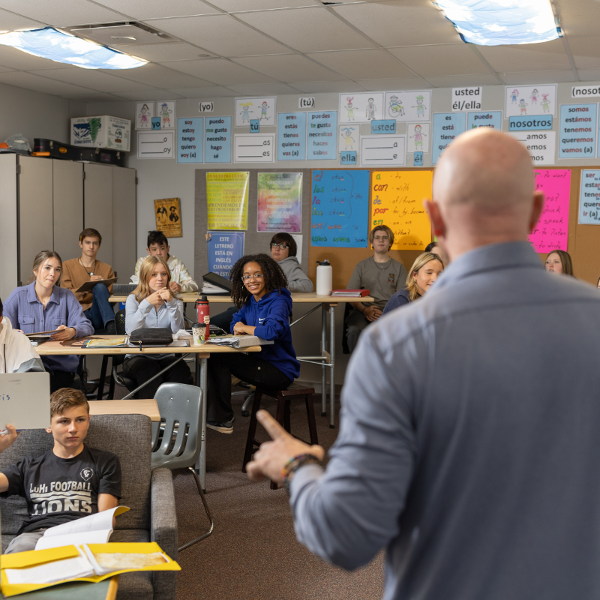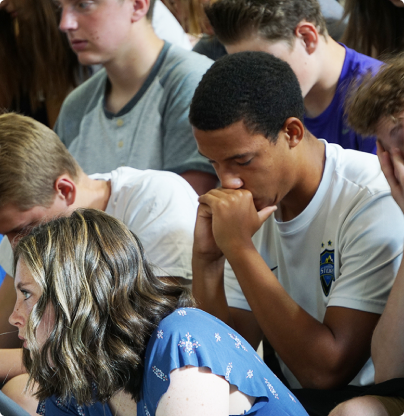What makes a high school great?
THREE THINGS TO CONSIDER IN YOUR SEARCH.
Don’t have time to read it now? Download now, read later:

If you’ve begun the search for the right high school, then you’ve asked yourself (and probably your five closest friends), “What makes a high school great?” And maybe more specifically, “What makes a high school great for my student?”
Generally speaking, high schools market themselves in the same fashion:
- number of AP courses offered
- statewide test scores
- average ACT/SAT scores
- list of colleges students attend after graduation
While no one would argue that these metrics are important, discerning parents rightfully question if those are the accurate indicators of a great school.
To answer that question even further, the creators of GreatSchools.com wanted to see if other factors were at work in schools that parents considered great: As time went on and [they] delved deeper into the mystery of what defines a great school, and they realized that test scores were valuable — and overvalued. . . [they] devised a five-part portrait of school climate and culture: Robust teacher support of students; Active family engagement; Supportive environmental conditions; Strong social and emotional student growth; and A school-wide climate of high expectations Together, these five criteria will help GreatSchools to identify schools that foster a broad set of skills, in addition to producing high test scores.1
A recent article in Education Week2 titled “The Five Attributes of Successful Schools” listed these five characteristics:
- Excellent school leadership
- High expectations for both teachers and students
- Ongoing evaluation and assessment to fix any learning barriers
- Goals and direction for the organization
- Secure environment for students and overall organization
Table of Contents
The Answer: A Life Coach
Table of Contents
There's more to it than a test.
We're inviting you to think differently.
Annually, administrators at Lutheran High School sit down to discuss what qualifications a high school needs to be considered great. The discussions are lively and robust, each person bringing their own perspective about what separates excellent high schools from good ones.
At the end of it all, one resounding theme continually surfaces: Great “coaching” makes for a great high school. (Please keep reading - this is not an ebook about athletics.)
Realistically speaking, high school is really four years of life coaching. Think for a second about all of the different areas in which high school students will receive guidance and instruction (coaching) during their time in school:
- guidance in subject areas
- emotional guidance
- college and career guidance
- spiritual guidance
- advice about family and relationships
- direction on extracurricular activities, etc.
The list is long. How absolutely amazing it would be for a parent to trust and know that those who are doing the coaching in each of those areas are top-of-the-line, well-trained, passionate people who love kids and reflect the values taught at home.
Simply put, we believe high schools should be measured with standards beyond normal expectations. The best high schools can coach students to succeed at a higher level than other school options.
You, as parents, simply want the best life coaches you can find to help your son or daughter learn, grow, and develop. You seek that level of coaching and often pay top dollar to provide that advantage for your children.
And while everyone will try and convince you that “they have the market cornered on good guidance,” - the truth is that most parents know excellent coaching when they see it.
So what should you look for when it comes to finding this in a high school? In this ebook, we list three elements to look for when considering high schools for your student.
The Role Teachers & Admin Play
It starts with teacher talent.
Look for teachers and administrators that seem to have an innate ability to inspire students to give their God-given best, even if it takes multiple attempts and strategies.
When talking about Lutheran High School teachers, Dan Gehrke (Executive Director at LuHi) will often talk about the desire to have an entire staff of teachers with this ability. One of his favorite terms is: “talent whisperers.” The idea of a talent whisperer comes from the book, The Talent Code by Daniel Coyle.
What should a parent look for in a teacher to know if they have this ability or not? Teachers who are talent whisperers:
- Question well
- Draw information out of students
- Lead quality discussions
- Convey expertise
- Re-explain concepts however many times it takes for a student to grasp a concept
- Instinctually find the right approach to motivate
Talent whisperers work best in a highly relational environment. They teach in the context of “what is best for the individual student.” When a teacher knows a student well, it enhances the odds of pushing the right buttons to maximize performance exponentially.
A talent whisperer at work in a classroom can handle a wide array of student needs and abilities: advanced students, average students, and low-level students thrive in the same classroom simultaneously.
The classroom is a place where every student is appropriately integrated into learning. Each student is seen as a unique puzzle to learn how to maximize their performance. Talent whisperers are master motivators.
Unfortunately, average coaches without the ability to crack the code for what works best for a student will often take a one-size-fits-all approach to pedagogy. Sometimes, the subtle message from weaker teachers is “I can’t teach this kid.”
Often, talented students are stifled when a teacher fails to inspire, motivate, and challenge them at an appropriate level.
The Role Students Play
It's an all-in attitude.
Look for a student body that believes they belong to something special.
When great life coaching is present, student engagement at a high level is sure to follow. Great coaches get students fully bought in and instill in them a sense of belonging and shared vision and mission.
This can be observed in schools beyond the classroom. It can be seen in students participating in homecoming dress-up days, cheering on their classmates at the game, and participating in extracurricular activities.
We suggest that parents check:
- Do the students come to all-school service days?
- Do they get excited about school-wide events?
- Can the students echo the mission and vision of the school?
- Have they bought into what the “coaches” are promoting?
High school has never been just about college preparation. Great high schools lead students to discover passions, share goals, experience successes, and experience failures.
Great coaching teaches kids to “sell out,” to be “all in,” and to take the risk of pursuing goals and getting back up when they fail.
This is a focus at Lutheran High School. The message is “be all in.” We demand it from our students.
And when the school culture is one of involvement, a sense of belonging spreads. That’s the added effect of excellent coaching and leadership. Parents should look for genuine school pride from students.
Are students proud to wear their school gear? Are they eager to represent what the school stands for to the community? Do they show they’re excited to come to school by their words and actions?
The Role of Accountability
It’s about accountability being taught and expected.
Look for the message of “Admit it, own it, and adjust it.”
What does true accountability look like in the best high schools? Outstanding life coaching leads students to have the highest standards of accountability. Great schools have staffs that are unified in teaching students to admit their mistakes, own the consequences, and adjust their behavior.
To be fair, not every family wants the level of accountability that the best schools will provide. And to be honest, not every school is committed to a high level of student accountability. It’s hard work and a daily challenge for even the best talent whisperers. But it is tangible and can be seen.
Student discipline situations, while rarely pleasant, can provide a glimpse into how a school approaches student accountability.
Average high schools see student discipline as a byproduct of teaching high schoolers. Great high schools use student discipline as an effective teaching tool that is essential in the development of students.
The Lutheran High School Assistant Principal proudly says: "Rarely do the kids who mess up and end up in my office leave the meeting feeling worse than when they entered. We take the time to dig deeper to the root of an issue, so they admit what happened, own the consequence, and then - most importantly - adjust their behavior."
Good high schools consistently handle student discipline- according to a stated code of conduct and with other discipline decisions made during the school year.
Great high schools have teachers, administrators, and deans who are consistent with consequences and fully convey a truly loving message. Caring for a student has to involve the student admitting when wrong, owning the consequence, and working to adjust future behavior.
For students to grasp that message, establishing trust between the adults and students in the situation is a must. The added advantage of a high school rooted in a Christian worldview is that the concept of total forgiveness and restoration is a part of the discipline process.
Conclusion
When it comes to your student's education, don't settle.
With these three things in mind, we encourage you to search for great “coaching” in the high schools you consider. Find a great high school. You have an open invitation to observe at Lutheran High School to discover those tenets of what makes a high school great here. We believe you’ll find them here.
To learn more about talent whisperers, LuHi’s core values, and how students thrive here every day, schedule your tour with our Admissions Department by emailing admissions@lhsparker.org or calling 303-851-5551.



